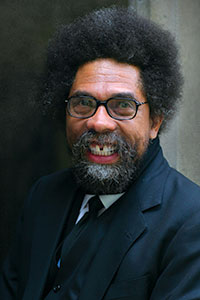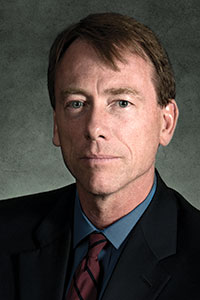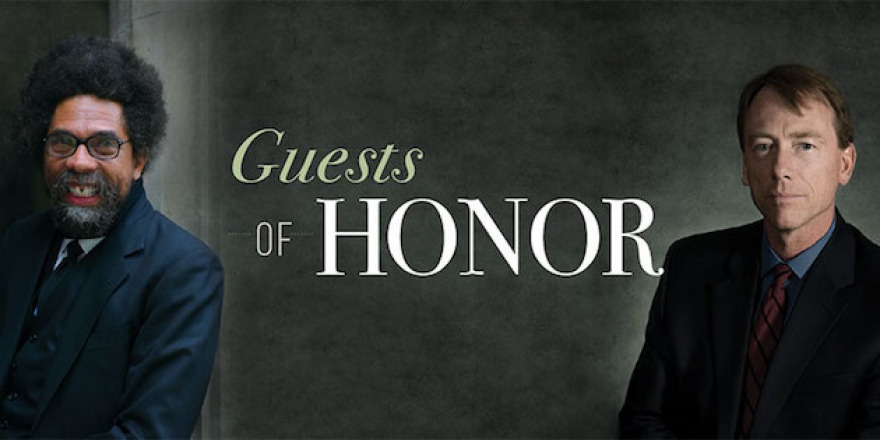Guests of Honor
Meet the two visiting professors who engaged students in inquiry this spring
Cornel West
Distinguished Visiting Professor in Global Leadership
Graduate School of Education and Psychology
COURSE: Ethics, Personal Leadership, and Social Justice
Over the last 15 years, the Ethics and Personal Leadership course led by professor Farzin Madjidi, associate dean of the Graduate School of Education and Psychology Education Division, has emphasized to students the relationship between civility and discourse and how necessary the alignment of their thoughts, beliefs, and actions are to their success as leaders. This spring the course included a social justice component and was co-led by author and public intellectual Cornel West, Distinguished Visiting Professor in Global Leadership, an appointment that was made possible by alumna Kathy Danhakl (MA ’02) through the Danhakl Family Foundation. In partnership with Madjidi, West led students of both the EdD program in Organizational Leadership and Change and the PhD program in Global Leadership and Change—Pepperdine’s first-ever PhD program—on an exploration of how civility and discourse can engender radical change.
 “When we talk about civility, we’re talking about civilitas, which relates to the public sphere and public conversations—trying to respect the
views of others but also being willing to stand up for things that have to do with
our common humanity,” shares West, who is professor of the practice of public philosophy
at Harvard Divinity School and Professor Emeritus at Princeton University. “We need
leaders who exemplify the courage, the compassion, the maturity, and the integrity
connected to broad visions that embrace everybody.”
“When we talk about civility, we’re talking about civilitas, which relates to the public sphere and public conversations—trying to respect the
views of others but also being willing to stand up for things that have to do with
our common humanity,” shares West, who is professor of the practice of public philosophy
at Harvard Divinity School and Professor Emeritus at Princeton University. “We need
leaders who exemplify the courage, the compassion, the maturity, and the integrity
connected to broad visions that embrace everybody.”
As an educator, a critical part of West’s mission is to encourage students to find their voice and engage them in their own quest for truth by examining the figures throughout history who have demonstrated a desire for change through compassion, “so leaders in the making can see the leaders in the past who exemplify those values,” he explains.
From January to April, West led the in-person component of the course that focused on topics of social justice and ethics. The curriculum employed themes from his own books, Race Matters andBlack Prophetic Fire—both seminal texts in the study of diversity and inclusion. Madjidi, a widely known expert in diversity in education, coordinated the online component and focused on ethical and personal leadership while weaving in themes of inclusion, diversity, and social justice.
“We don’t view social justice as a topic or mandate,” Madjidi explains. “We believe it’s the right thing to do and that it must be ingrained in the values of every leader.”
Students explored themes of social justice and ethics as they reviewed trial footage, case facts, and other readings of two high-profile cases—that of Tookie Williams’ execution and the Menendez brothers' trial—with marked differences in privilege, wealth, and access. Students acted the part of a clemency board and, by analyzing their own beliefs, as well as literature focused on justice, punishment, and privilege, were able to critically examine their deeply held values and how they make decisions based on multiple factors.
Their values and beliefs are what West believes are special about Pepperdine students. “They raise their voices with respect in a civil but passionate way, because, thank God, they are on fire,” says West. “They care about justice. They care about their neighbor.”
West explains that his faith also plays a significant role in the ways that he encourages students to evaluate their leadership potential.
“As a Christian, I begin with a certain kind of intellectual humility. That I am fallen. That I am finite. That I’ve worked to think through some issues, but I could be wrong,” he says. “I may have certain expertise regarding one subject matter, but I still have my own form of learned ignorance, so I have to be critical of myself and, most importantly, listen and learn from the students.”
Jeffrey Sikkenga
William E. Simon Distinguished Visiting Professor
School of Public Policy
COURSE: Public Policy and Religion: Religious Liberty
As the Supreme Court prepares to determine an outcome in the case of Masterpiece Cakeshop v. Colorado Civil Rights Commission, Pepperdine students will have the opportunity to study and think through the issues alongside court proceedings. “Once you get beyond the fact that everyone agrees on having religious freedom and get to what it actually means—and what it means for public policy—we get some pretty important differences pretty quickly,” says Jeffrey Sikkenga, who this spring will teach a course on religious liberty as the William E. Simon Distinguished Visiting Professor at the School of Public Policy. “We’re going to have a lot of conversations. We’re going to be living it.”
 Through the examination of writings by visionaries like George Washington, Thomas
Jefferson, John Adams, and James Madison, Sikkenga will lead students on an exploration
of the disputes among the American Founders on issues of politics and religion and,
in particular, religious freedom. “There are theoretical arguments but also practical
public policy issues that they grappled with in the beginning of the Republic,” Sikkenga
explains. “We’re also going to look at how the Supreme Court has interpreted the first
amendment, particularly the free exercise of religion clause.”
Through the examination of writings by visionaries like George Washington, Thomas
Jefferson, John Adams, and James Madison, Sikkenga will lead students on an exploration
of the disputes among the American Founders on issues of politics and religion and,
in particular, religious freedom. “There are theoretical arguments but also practical
public policy issues that they grappled with in the beginning of the Republic,” Sikkenga
explains. “We’re also going to look at how the Supreme Court has interpreted the first
amendment, particularly the free exercise of religion clause.”
The course, Public Policy and Religion: Religious Liberty, will engage students in an exploration of John Locke’s A Letter Concerning Toleration, one of the foundational texts in the Western tradition arguing for religious liberty and one that Sikkenga himself is currently exploring in a book of his own. He is con dent that students will be fascinated by Locke’s arguments with opponents in his own day who were against religious freedom, especially the ones who argued for an established church and religious persecution. Religious liberty, Sikkenga contends, has reemerged as a problem in America to be grappled with. “Going back to a text like Locke’s helps us to rethink those fundamental questions.”
Some of Sikkenga’s most memorable moments as a political science professor at Ashland University in Ohio are the natural conversations that emerge when undergraduate students, for the first time, encounter the profound thoughts and questions raised by familiar historical figures whose works they have never explored deeply. Through the undergraduate and graduate courses he teaches in political thought, the American founding, and American constitutional law at his home institution, Sikkenga facilitates conversations about the great thinkers and helps shepherd important thoughts that students confront in introductory texts.
“Does it make sense? What criticisms can we raise? What arguments can we make to defend the author?” insists Sikkenga, who considers himself, as Socrates put it, a midwife for other people’s thoughts. “I don’t think it’s my job to tell students what to think or even tell them what I think. When we discuss a text, I make the best argument I can for the author no matter who the author is and whether I agree with the author or not. It’s my job to make that argument and spur that conversation.”
That kind of inquiry, Sikkenga explains, is what history and political science—the foundational disciplines for public policy—are supposed to do. “That’s actually the original meaning of the word “history”: inquiry. We’ve lost that in our disciplines. I love it when the students take over the class in conversation. Oftentimes, when we get to disagreement in some places in classes, that’s where the discussion ends,” he continues. “In my opinion, that’s where it has to begin.”
